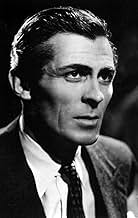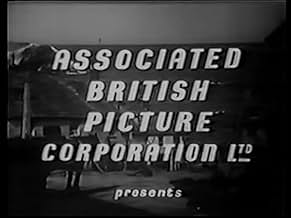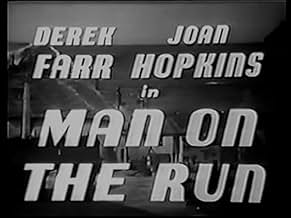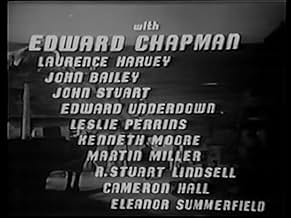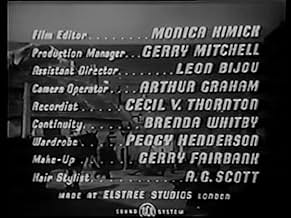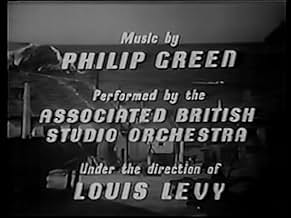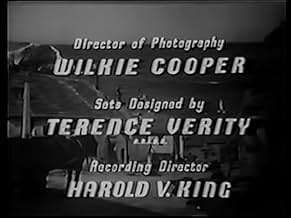Adicionar um enredo no seu idiomaIn post-war Britain, an army deserter unwittingly gets involved in murder and armed robbery and enlists the aid of a war widow to help clear his name.In post-war Britain, an army deserter unwittingly gets involved in murder and armed robbery and enlists the aid of a war widow to help clear his name.In post-war Britain, an army deserter unwittingly gets involved in murder and armed robbery and enlists the aid of a war widow to help clear his name.
Howard Marion-Crawford
- 1st Paratrooper
- (as Howard Marion Crawford)
Kenneth More
- Corporal Newman
- (as Kenneth Moore)
Martin Miller
- Cafe Proprietor
- (as Martyn Miller)
Avaliações em destaque
An astringent little drama painting a vivid picture as shot by Wilkie Cooper of a seething postwar London rife with deserters, blackmailers and other lowlifes.
Top-billed Joan Hopkins is rather stiff as the heroine, but this actually renders her more more rather than less appealing - not being conventional leading lady material - and as usual the supporting case is full of entertaining surprises, including early appearances by Kenneth More and a moustached Laurence Harvey in only his second film role as a detective.
Top-billed Joan Hopkins is rather stiff as the heroine, but this actually renders her more more rather than less appealing - not being conventional leading lady material - and as usual the supporting case is full of entertaining surprises, including early appearances by Kenneth More and a moustached Laurence Harvey in only his second film role as a detective.
"Man on the Run" is interesting for several reasons.
One is the postwar atmosphere in England and the problem they had with deserters, many of whom were on the run and resorting to crime. Here in the U. S., 21,000 people were charged and sentenced for desertion during World War II - 49 were sentenced to death, but only one sentence was carried out.
Although over 21,000 American soldiers were given varying sentences for desertion during World War II, including 49 death sentences, Slovik's death sentence was the only one that was carried out.
The main character in this is Peter Burden (Derek Farrar). After four years in the service, he needed extra time on his leave because his sister was dying. He was refused and stayed with her anyway.
Peter is in hiding when approached by someone who knew him, a Corp. Newman (Kenneth More, in a small part). Newman wants blackmail money; instead, Peter takes off.
When Peter tries to pawn his gun, the pawnshop is robbed at the same time by two men. The police think it's three. He is being chased through the streets when he runs into an apartment building. There he meets a widow, Jean Adams (Joan Hopkins) who agrees to help him. She hides him and lets him stay at her place.
Peter knows certain distinguishing features of one of the men and feels if he could just find him, the police would learn of his innocence. By a series of circumstances, the police zero in on Jean, so she and Peter take off to a friend's place out of London.
The chase continues, and it's Jean who actually sees someone in a cafe that she thinks is one of the robbers.
Too many coincidences in the story, but the actors are likeable, and you do pull for both of them.
Not only did More appear, but all during the film, I kept thinking one of the police detectives looked like Laurence Harvey. That's probably because it was Laurence Harvey.
One is the postwar atmosphere in England and the problem they had with deserters, many of whom were on the run and resorting to crime. Here in the U. S., 21,000 people were charged and sentenced for desertion during World War II - 49 were sentenced to death, but only one sentence was carried out.
Although over 21,000 American soldiers were given varying sentences for desertion during World War II, including 49 death sentences, Slovik's death sentence was the only one that was carried out.
The main character in this is Peter Burden (Derek Farrar). After four years in the service, he needed extra time on his leave because his sister was dying. He was refused and stayed with her anyway.
Peter is in hiding when approached by someone who knew him, a Corp. Newman (Kenneth More, in a small part). Newman wants blackmail money; instead, Peter takes off.
When Peter tries to pawn his gun, the pawnshop is robbed at the same time by two men. The police think it's three. He is being chased through the streets when he runs into an apartment building. There he meets a widow, Jean Adams (Joan Hopkins) who agrees to help him. She hides him and lets him stay at her place.
Peter knows certain distinguishing features of one of the men and feels if he could just find him, the police would learn of his innocence. By a series of circumstances, the police zero in on Jean, so she and Peter take off to a friend's place out of London.
The chase continues, and it's Jean who actually sees someone in a cafe that she thinks is one of the robbers.
Too many coincidences in the story, but the actors are likeable, and you do pull for both of them.
Not only did More appear, but all during the film, I kept thinking one of the police detectives looked like Laurence Harvey. That's probably because it was Laurence Harvey.
The blu ray cover says this is a key post war British noir unseen since the first release.
I don't think it is a key film compared to It Always Rains On Sunday or The Blue Lamp.
I like the film,it looks good.
The pub sets look great,I want to eat in that cafe,is it Fitzrovia maybe?
But the tone of the film is stiff and dated compared to Waterloo Road or It Always Rains on Sunday.
Don't get me wrong,it is not a bad film but it is not daring compared with It Always Rain.
Indeed They Made Me A Fugitive is similar in theme to this and a better film in my opinion.
10clanciai
What you will remember of this film is the local atmosphere from the post war London with its rather weary aspect both in people and their minds and the shaggy streets, ultimately leading you down to old Wapping with one of the most genuine pub atmospheres found in any film, but there is a long way to go before that.
You will also remember the difficult case of 20,000 deserters after the war, many of them turning to criminality for having no other choice. That's the clinch in which our hero finds himself, when a burglary takes place the moment he is trying to pawn his old gun without bullets, the two robbers in desperation shooting both the clerk and, when on the run, a policeman fatally - the first casualty in the film. The clerk recovers and gives a description of our hero, whom he saw, while the two burglars were masked. So our hero finds himself wanted for murder. Could you get into any deeper sea of trouble?
It's also memorable for the fine performance by Joan Hopkins, who plays a widow who believes in our hero's innocence, Kenneth More has a small part in the beginning, which turns out fatal for our hero on a constant run, and Laurence Harvey is a policeman - neither is sympathetic. Derek Farr plays our hero convincingly enough, a completely ordinary man with an inordinate amount of bad luck, having lost practically all his family in the war. It's a sad story but well made, and the beautiful music adds some extra romantic and melancholy charm to it. In spite of the poor technical quality, I must give it almost a full score for its interesting story of an eloquent script, fluent tempo and excellent cinematography.
You will also remember the difficult case of 20,000 deserters after the war, many of them turning to criminality for having no other choice. That's the clinch in which our hero finds himself, when a burglary takes place the moment he is trying to pawn his old gun without bullets, the two robbers in desperation shooting both the clerk and, when on the run, a policeman fatally - the first casualty in the film. The clerk recovers and gives a description of our hero, whom he saw, while the two burglars were masked. So our hero finds himself wanted for murder. Could you get into any deeper sea of trouble?
It's also memorable for the fine performance by Joan Hopkins, who plays a widow who believes in our hero's innocence, Kenneth More has a small part in the beginning, which turns out fatal for our hero on a constant run, and Laurence Harvey is a policeman - neither is sympathetic. Derek Farr plays our hero convincingly enough, a completely ordinary man with an inordinate amount of bad luck, having lost practically all his family in the war. It's a sad story but well made, and the beautiful music adds some extra romantic and melancholy charm to it. In spite of the poor technical quality, I must give it almost a full score for its interesting story of an eloquent script, fluent tempo and excellent cinematography.
Although I saw this on a very poor DVD transfer it held my attention from beginning to end. Yes, as other reviewers have pointed out, there's nothing new here, but it's expertly done, and it's interesting to know that there were apparently 20,000 deserters on the run in the UK in 1949, and one imagines that many of them were as hard-done-by as our hero, but I won't spoil anything by revealing why he deserted. The film is certainly sympathetic to those 20,000 men who get the blame, by several representative members of the cast, for everything that's wrong with post-war Britain. Derek Farr is excellent in the main role as the deserter who has to raise some money when Kenneth More, who had served in the same outfit, happens into the pub where he's working under an alias and decides to blackmail him. While he's trying to pawn a gun the pawnshop is robbed and a policeman killed making him one of the suspects. Joan Hopkins is the sympathetic woman who helps him. Edward Chapman is the inspector investigating the case with ever-increasing impatience. Laurence Harvey, although billed fourth, has little to do as a sergeant with a soft spot for Hopkins. Plenty of noir atmosphere. Recommended.
Você sabia?
- CuriosidadesThe dialogue includes several clear uses of "basket" as a minced oath for "bastard". However the film was given an 'A' certificate (for "Adult Audiences") by the British Board of Film Censors, because of the depiction of an armed robbery.
- Erros de gravaçãoKenneth More is listed as Kenneth Moore in the opening credits but is listed correctly in the closing credits.
- Citações
Sgt. Peter Burden, alias Brown: Well, do you believe any of this, or am I just wasting my time?
Principais escolhas
Faça login para avaliar e ver a lista de recomendações personalizadas
Detalhes
- Data de lançamento
- País de origem
- Idioma
- Também conhecido como
- Mann im Netz
- Locações de filme
- Empresa de produção
- Consulte mais créditos da empresa na IMDbPro
- Tempo de duração
- 1 h 22 min(82 min)
- Cor
- Proporção
- 1.37 : 1
Contribua para esta página
Sugerir uma alteração ou adicionar conteúdo ausente

